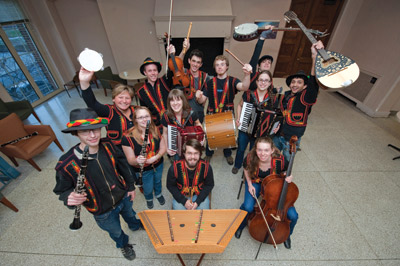“Making Languages of Songs Come Alive” Carpathian Music Ensemble brings sounds of Eastern Europe to Pitt

Listening to the sounds of the University of Pittsburgh’s Carpathian Music Ensemble, one can imagine being on the streets of Eastern Europe, watching a village band play its lively complex rhythms.
The ensemble, established and directed by Adriana Helbig, an assistant professor of ethnomusicology in Pitt’s Department of Music, brings the sounds of Slovakia, Ukraine, Poland, Macedonia, and Bulgaria to the University. Students play their interpretations of Romani (Gypsy), Jewish, Carpathian, and Balkan music with such instruments as the sopilkas (flutes), tapan and dombek (drums), bouzouki (similar to a mandolin), and tsymbaly (hammered dulcimer). Members wear colorful vests embroidered for them in a Ukrainian village.
Helbig became interested in Romani music while she was studying classical piano at the Vienna Conservatory in Austria. It was there, at concerts and in small cafés, that she first heard Balkan and Gypsy music. Upon returning to the United States, she received her doctorate in ethnomusicology from Columbia University, writing her dissertation on Romani music.
Before joining Pitt’s faculty in 2008, Helbig was an instructor of ethnomusicology at the University of Illinois at Urbana-Champaign, as well as at Columbia and Fordham universities. When she arrived at Pitt, the Department of Music asked her to put together a student music ensemble. Her own interest in Slavic music, combined with the Pittsburgh region’s significant Eastern European heritage, led her to assemble the Carpathian Music Ensemble.
Members of the ensemble receive one credit for participating in the ensemble, a course that is open to all Pitt students. Helbig says that students make considerable progress in their musical abilities throughout the semester.
“As they get more familiar with the music and different genres, they are now really forming their own sounds,” she says. “They are fusing different sounds together, or interpreting music in different ways—for instance, interpreting a Slovak song in an Irish way. They’ve become very original in what they are doing with the music. The joy and confidence that they have in their music really translates to the audience.”
Elizabeth Cook, a sophomore majoring in music and economics, has played in the ensemble for two semesters and plans to continue for many more. Cook, who plays cello, said she enjoys it when the group adds its own “twists” to the music. “There’s never a dull moment when working with so many good musicians,” she says.
At Cook’s suggestion, the ensemble has begun singing a verse or two of the songs it performs. “I love that our ensemble is a bit of an Eastern European mongrel,” she says. “But when we sing all together, we take on, for a moment, the more specific persona of the people [who created the music we are playing]—letting the languages of the songs speak for themselves.”
Cook said the ensemble is an important musical offering at Pitt. “It contributes so much to our already culturally diverse music department,” she says.
While the Carpathian Music Ensemble plays at local festivals and community events, it will play its full repertoire this spring at 8 p.m. March 26 in the Frick Fine Arts Building. Tickets are available at www.proartstickets.org.
Helbig also teaches a course in world music, where students learn about traditional and popular music from countries around the world. Helbig says her students contextualize musical information in terms of geography and history and learn how certain music genres are influenced by politics, cultural policy, economics, and globalized media and technology. The one-semester course is so popular that it is always full, says Helbig.
Other Stories From This Issue
On the Freedom Road

Follow a group of Pitt students on the Returning to the Roots of Civil Rights bus tour, a nine-day, 2,300-mile journey crisscrossing five states.
Day 1: The Awakening
Day 2: Deep Impressions
Day 3: Music, Montgomery, and More
Day 4: Looking Back, Looking Forward
Day 5: Learning to Remember
Day 6: The Mountaintop
Day 7: Slavery and Beyond
Day 8: Lessons to Bring Home
Day 9: Final Lessons

